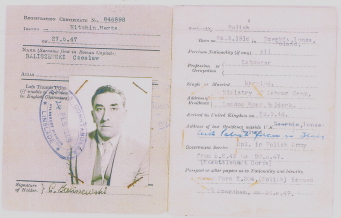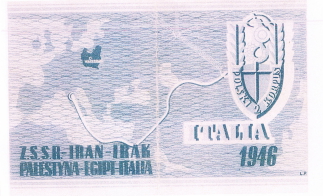Jan Baliszewski
Jan gave the Marsworth committee a great deal of help and support during 2019, including a very generous donation towards the cost of the unveiling and exhibition.
He also supplied a detailed account of his memories of his childhood in Marsworth.
My family arrived at the Marsworth Polish Camp in September 1951; they chose this camp as many people there were friends and army comrades. Our home was a hut, situated on Site 7.
My mum told me when we first arrived at the camp that there was communal catering, then cast iron range cookers were installed in the huts. They were given ration books and then began catering for themselves.
Our hut was furnished with ex-army iron framed beds, mattresses and bedding, folding chairs, table and wardrobes. The floor was covered with black bitumen; on this my mum put some rugs down and in the middle stood a pot-bellied coke-burning stove, with a long flue exiting through the roof. This was the only source of heating; we also acquired some extra paraffin burning heaters to help with the cold.
There was one large bedroom which was divided into two rooms by a curtain; we also had a bed in the living room which doubled up as a settee.
For entertainment we listened to the radio and a wind-up record player. We had electricity in the huts, but no running water - mains water was obtained by a stand pipe, which we shared; there were a few on the site.
We had shower and toilet blocks which were shared. The toilets in the block were numbered on the cubicle doors with the same number as the hut, for hygiene; there were also blocks with baths and washrooms for laundry and our huts were clustered around them. These ablution blocks did have hot and cold running water, but were not heated and were very cold in the winter. The hot water was heated by big boilers fuelled by coke on selected days only.
I liked watching the nice elderly man, who was a good friend of my mum and dad’s, load the coke into his wheelbarrow from the big coke yard at the main entrance of the site and wheel it over to the boilers; we always had a chat and I also liked watching the lorries tipping the coke into the coke yard.
We also had on site allotments near to our hut, where my mum and dad liked to grow their own vegetables. They also kept chickens and I loved looking for the eggs. Some people on site grew their own tobacco as I could see the leaves strung up to dry; eventually the camp’s authorities, pressed by Customs and Excise, did eventually stamp out the practice.
We had a butcher delivering meat and poultry to the camp - Gregory's of Long Marston. Baked bread and cakes came from Tring. There was also a hardware van which came once a week; people could buy paraffin and wicks for the tall metal round heaters which we used inside the huts for heating rooms in the winter and many other needed items.
The Polish huts were called ‘beczki’ (barrels – referring to the shape of the Nissen huts).
We had an entertainment hall with a stage and it was used for showing films, stage productions, dances, meetings and national celebrations. There was also a sub post office, sick bay, surgery and a social club.
There was also a church on Site 8, where I had my first communion. The main religious festivals were Christmas, Easter, Corpus Christi and Assumption, as well as All Saints’ Day (1st November) when almost everyone in Poland, regardless of their religious denomination, visits the graves of relatives.
There was a football pitch between Sites 7 and 8 where a football team played other villages. My brother Jurek was a very good player, ending up playing for Pitstone and lvinghoe football club (1966).
Before primary school I attended a nursery school which was run by some Polish ladies; this was on Site 12, at the top of Church Farm Lane. I remember it had little fold up beds so we could sleep if needed. This allowed my mum to work in the vegetable fields for the local farmer, also near Site 12. We had our meals and any medication that we needed given here and daily cod liver oil with a spoon which I did not like.
At the age of five, with a handful of other Polish children, we were sent to Marsworth village primary school which was about one mile away from the camp. To get there I could go two ways: one way was out of the main entrance of the camp, along Long Marston Road, past the garage, then over the canal bridge. The other choice was along the path from my home to Lock 3, cross over, left to the canal bridge, then left along Church Lane to the school; this way was quickest and my Mum took me this way the most times.
The first few months at school were not very happy ones for a five-year-old turning up in a strange environment, unable to speak or understand the language. Communication was very difficult, however I soon learned enough English to get by. This was mainly due to the extremely kind and patient headmistress who took me and the other Polish children in turn into the school house and taught us to read from English books (Penguin Books). The teachers were all very kind and understanding. I began to enjoy the rest of my years at the school and made friends with a lot of the English children who also helped with my English language and culture.
The shops that we used for sweets and ice cream after school were the Ship Shop by the canal bridge near the Red Lion pub and the shop half way along Vicarage Road.
My dad had a motorbike, an A.J.S 500cc which he loved. He used it to travel to work [at Tileman Cement Works in Pitstone]. I remember some summer days I would wait for him at the main entrance to the site and he would stop and sit me on the petrol tank in front of him and take me back to our hut. He kept it in a little shed next to our hut which was shared with our neighbour.
I remember a boy I played with who lived in the lock keeper's cottage at the bottom of our camp, Lock 4. He was in our group attending Marsworth School, and his name was David. I also made friends with the family of Marsworth Great Farm, by walking across the field which backed onto our camp. I played with their son in the farm house, I watched the cows being milked and had many adventures on the farm. The boy's name was Jet.
My favourite toys were a plastic dog on wheels that I pulled along and wind up tin cars. I had very few toys; games we played were mainly in the wooded area by the stream near Site 8, climbing trees and making camps out of branches.
We used to play at the sewage works behind Site 3. A little girl, Danuta Winnik, told me she used to sit on the sprinkler bars as they went round and round over the tanks.
I liked to watch the working barges passing through the locks with their cargo of concrete lintels [piles] for reinforcing the banks of the canal, which were made at Marsworth Wharf by British Waterways, while my dad sat fishing.
I have very fond memories of my childhood in the Polish camp in Marsworth. The people of Marsworth village were very friendly and helped in any way they could.
My family moved to Pitstone in 1961, where I continued my primary school years at Ivinghoe Primary School, as there was no school in Pitstone. I went on to become a skilled engineer and enjoyed my whole working life in the trade. I still live in Pitstone with my wife who I married in 1972.
On another note, my Mum, after leaving Africa when the war was over, had a choice to either go to live in England, America or Australia. If she had chosen another country, destiny would not have me writing this story today!
Czeslaw
Baliszewski
(father of Jan Baliszewski)
Born in Poland in1916 in Dzierzby.
When the war broke out I worked for the Forestry, married to Anna. In Feb 1940 my wife and I were transported to Siberia in Russia to a labour camp. We had two very young children who both died at the camp, victims from the cold and malnutrition, as temperatures could reach -40c in the winter. Some of our warm clothing/ fur coats we had to exchange for food.
In 1942 we were released and made our way with others to Persia (Iran). My wife Anna, with thousands of women and children and the elderly were sent to displaced persons camps in Africa (Tanganyika), now Tanzania.
From Iran for me, I was called up to join the Polish Free Army, which was formed by General Anders. The army went on to Palestine and Iraq and North Africa, to be trained by the Allies, which were mainly British, then took part in the fighting in Italy at Monte Cassino, Ancona, the Gothic line and Bologna alongside the British 8th Army Division. Our division was 2nd Corps, 3rd division Carpathian Rifle Infantry division.
After the war I was demobilised from the Army rank of Corporal. On arrival in England from Italy in 1946 I found work. I was stationed at the Ministry of Labour camp in Baldock in 1947. Here I was reunited with my wife Anna, who had spent the war in the displaced persons camp in Africa, and for those years we had no contact, even not knowing if each other were still alive. The Red Cross helped to re-unite families on our arrival in England.
Then we moved to the Polish Hostel, Letchworth in January 1949. From here as a family we moved to the Polish Hostel Marsworth in September 1951. In 1961 we moved to Pitstone (a nearby village) where we settled in a new home.



